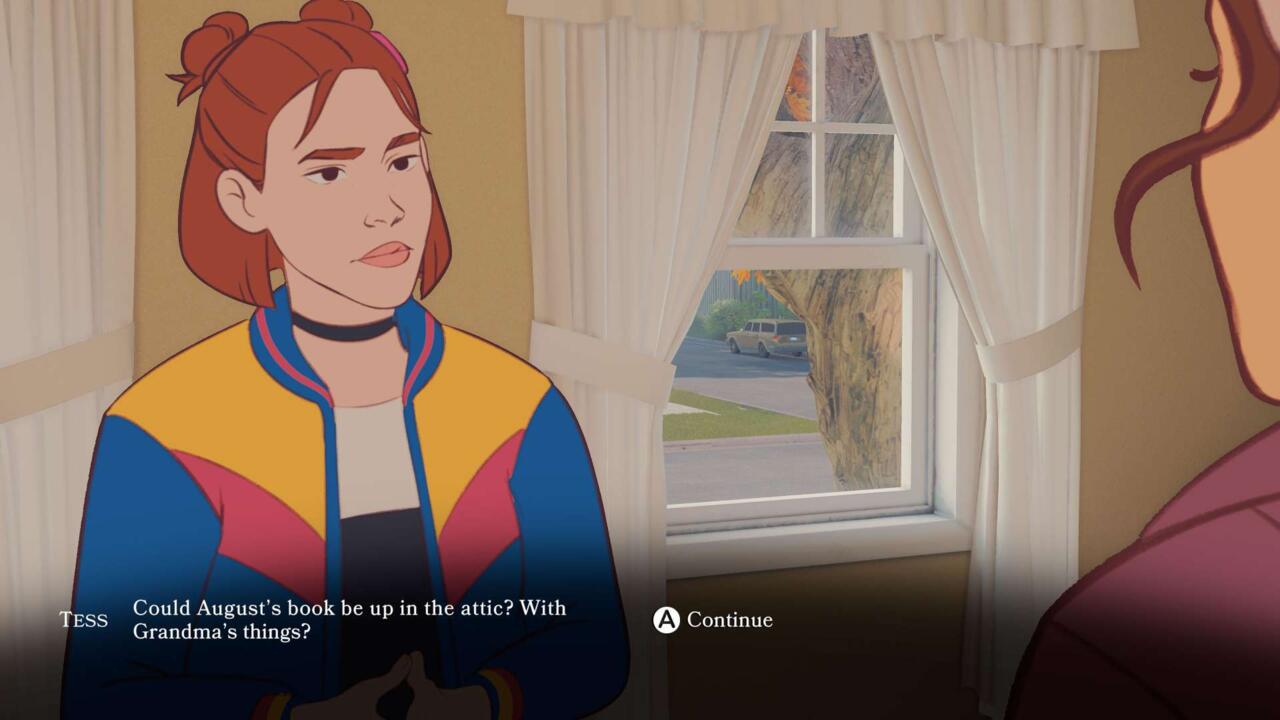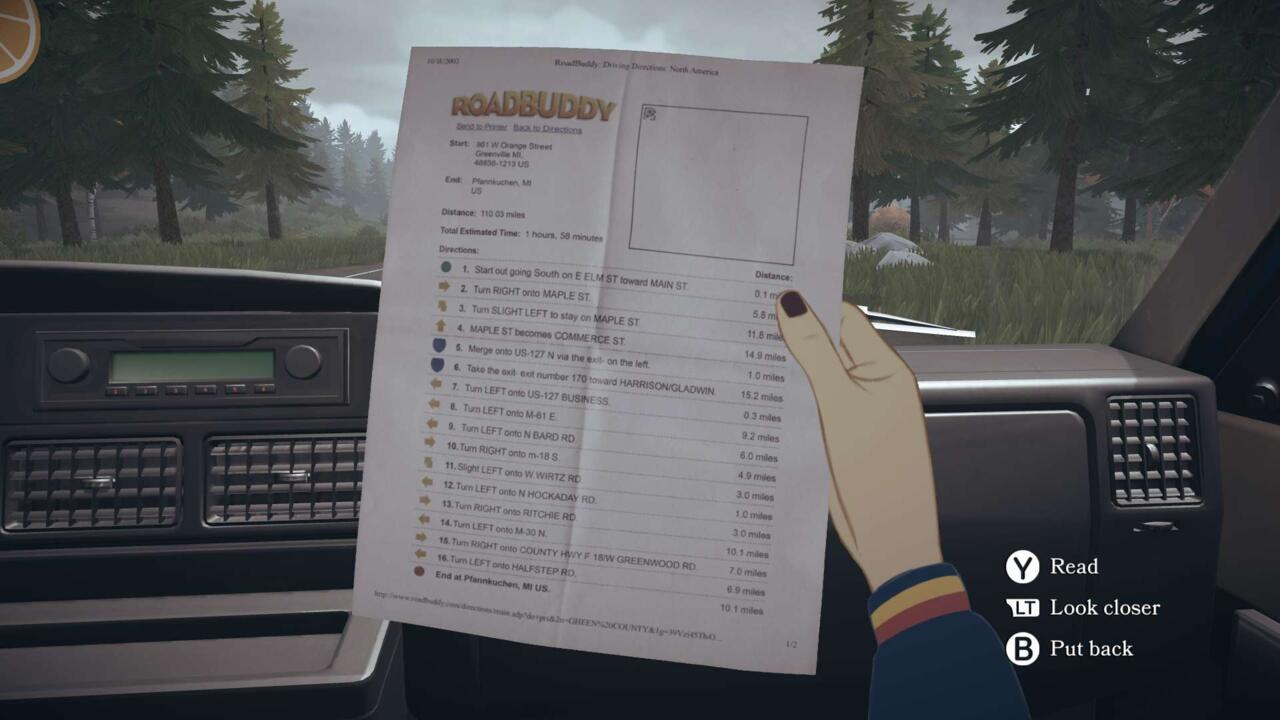I once read in a very profound article published in a very prestigious magazine (okay, it was a TikTok) that “daddy issues” make artists while “mommy issues” make writers. I can’t attest to the science–or lack thereof–behind this statement, but as a writer born into a long line of guarded women who wielded pens as weapons, I can absolutely relate.
As such, I have a particular fondness for mother-daughter stories and the catharsis they can offer. When I heard the team behind Gone Home would be tackling the subject in their upcoming game Open Roads, I braced for a beautiful cross-country journey that would inevitably hit too close to home. However, while Open Roads has moments of relatability that are powered by solid dialogue, charming characters, and nostalgia, I was ultimately left underwhelmed by the walk-and-click exploration game. With a runtime too short to truly pull players in and an abrupt ending that leaves things feeling hastily resolved, Open Roads feels more like a pit stop than an adventure.
That’s not to say the game’s premise isn’t interesting. Open Roads begins shortly after the death of the Devine family matriarch, Helen, and follows her daughter Opal and her granddaughter Tess as they cope with loss and what to do next. Throughout the entirety of the game, we play as Tess, a 16-year-old high school student who is every bit as strong-willed, cheeky, and hopeful as most 16-year-old girls are. On top of her grandmother’s death, Tess is also processing her parents’ recent separation and the loss of her home, as she and her mother lived with Helen but were not given the house upon her death.

While cleaning out her grandmother’s home, Tess and Opal stumble upon a suitcase buried within the attic walls and find what appears to be evidence of Helen’s secret life and a passionate love affair. With a week to go until the house is sold and an empty agenda, the pair set off on a series of short trips to get to the bottom of Helen’s mysterious life.
At each of the game’s handful of locations, you walk around as Tess and interact with objects from different time periods ranging primarily from the late ’60s to the early 2000s–the time the game is set in–that are sure to be familiar to many American millennials. Occasionally you’ll be able to pocket the items to use later, adding a slight puzzle element to what is otherwise a game driven by simple exploration, though these moments are few and far between. Certain items will also prompt you to call for your mom, who will chime in, add context, or mull over your findings with you. All this makes for straight-forward gameplay that can, unfortunately, start to feel a bit dull as the game goes on.
Outside of exploring the game’s dusty abodes and dimly lit motels, Tess spends most of her time riding shotgun in her mom’s late-’90s sedan. There, she’ll have the chance to cycle through mostly static-filled radio stations, chat with her mom, or use her trusty flip phone to text her father or best friend. Yet for a game titled Open Roads, your time spent on the road is extremely brief and only happens a handful of times, which ultimately takes away from the road-trip experience and doesn’t help to break up its repetitive gameplay.

This is a recurring issue, as the game in its entirety is too brief to effectively address everything it sets up or fully establish a deep sense of relatability and emotional connection. This is a shame considering the underlying plot is interesting and the game’s characters are very endearing. Though Kaitlyn Dever and Keri Russell might be known for their live-action careers, the pair bring a lot of personality to Tess and Opal respectively. Even Helen, who has no speaking parts and appears in the game only through grainy photographs, has a lot of personality. In fact, her vivaciousness is a frequent subject of discussion between Tess and Opal, who both exhibit her more free-spirited behavior, albeit in different ways. This is another aspect of the game I really enjoyed, as it’s all too often that mothers are written as protective, worrisome, uptight, and relatively flat–Open Roads avoids falling into that trap.
However, I also think Open Roads pivots a bit too far away from this mother-daughter tension. Sure, Tess and Opal do have their spats and Opal frequently expresses frustration towards some of her late mother’s actions, but for a pair going through grief, divorce, major life transitions, and betrayal, there’s a lack of drama that turns into a lack of evolution and catharsis. Between its overall brevity and hesitation to dig into messiness–humanness, even–Open Roads puts up a bit of a wall between the player and its story. As a result, I found I liked its characters, but I didn’t feel much towards them. While they were relatable enough, I didn’t find myself in them.
Sure, not all mother-daughter relationships are contentious or imitate Lady Bird, but in shying away from the emotional, you lose, well, emotions. For example, even with all the big plot points unraveling around them, the most impactful conversation in the game, to me, was the one Tess and Opal have after Tess accidentally leaves her phone at the hotel and demands they go back. As an adult, you’re able to see the situation rationally: It makes sense to finish up the drive and grab the phone on the way back–it’ll only be a night without it, after all. But Tess’s dialogue options are limited and a bit more intense than usual–she needs her phone. And despite being 30 years old, I still felt that desperation.
It’s clear that Open Roads wants to have meaningful conversations about generational trauma, the oft-dismissed complexity of mothers, and how humans have different ways of showing love, a fact that can lead to pain when misunderstood, and I wanted to have them too. Yet it doesn’t offer the time or vulnerability to dig into these interesting topics. And while some of its story beats are unique, or offer at least a slight variation on ones we’ve perhaps seen before, all of these stories end somewhat abruptly and without much fanfare or introspection.
Where the game does succeed in storytelling, however, is in its environments. Presumably thanks to the studio’s pedigree and history of working on exploration games like Gone Home and Tacoma, you can tell there is an understanding of how to make locations nostalgic without pandering, interesting but not overwhelming, and immersive but not disjointed. Though I’m slowly discovering that a lot of first-person exploration games make me a bit nauseous (definitely a “me” problem here, so I don’t fault Open Roads), I really enjoyed walking around the environments the studio created. There were so many objects and pieces of decor that reminded me of the ones I grew up with, and it was interesting to note how these objects–and the memories attached to them–moved me more deeply than a lot of the game’s conversations.


At every location, there were little reminders–be it newspaper clippings, a Blockbuster copy of Clueless, or a CorningWare-style casserole dish–of the time that had passed. Sure, this sense of place is aided by some of Tess and Opal’s conversations–I particularly loved the one in which Tess admits to her less-computer-inclined mother that her idea of a wild Friday night consists of pizza rolls and The Sims, because same–but a heavy amount of lifting is done by the artistry and detail put into creating these locations.
I also really enjoyed Open Roads’ character art, which feels inspired by the animated films ’90s kids grew up watching. The style stands out against the more realistic-looking environments and works well with the game’s voice acting, though the lack of proper lip-syncing did feel awkward at times. More awkward, however, was the game’s sound, which felt almost incomplete. I had expected to hear songs and sounds that would take me back to 2003, yet they were noticeably absent. While I wasn’t expecting to hear “Stacy’s Mom” or “Hey Ya!” pop on the radio, having multiple radios and TVs that you could interact with that did effectively nothing was a bit of a letdown.
It’s unfortunate that “letdown” and “underwhelmed” are words I’ve used multiple times when talking about Open Roads because there’s still so much about the game that works. The overall narrative touches on some meaningful topics, there’s a fair amount of intrigue, plenty of well-crafted dialogue, some interesting characters, and a lot of heart. Yet most things fall frustratingly short or are cut off far too early, making the whole experience slightly lackluster. Despite being a game about a mother-daughter road trip, the game doesn’t go too far and that relationship is left only slightly altered rather than meaningfully examined and changed.
